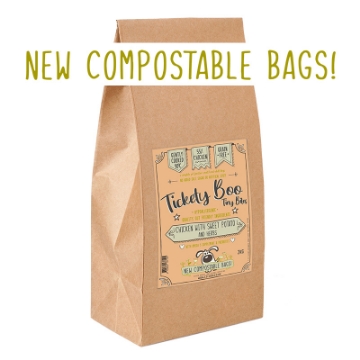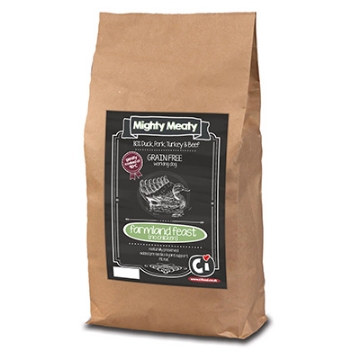Epilepsy & Brain Health
Dog food for epilepsy & brain health
Dog seizures can be caused by any number of reasons, but most commonly they are due to an inherited disorder, such as idiopathic epilepsy, but the exact cause is unknown.
Other common causes of seizures include issues with your dog’s health such as eating poison, liver disease, low or high blood sugar, kidney disease, electrolyte problems, anaemia, head injury, encephalitis or strokes.
Seizures can also occur when your dog’s brain has a change in activity, due to a particular stimulation or trigger. This can happen up to 30 hours after exposure to the trigger so the exact causes can be difficult to pinpoint at first &, in some cases, remain elusive.
Triggers can come in a myriad of forms - stimulation from the environment (e.g. herbicides, insecticides or fertilisers from the garden, extreme changes in temperature or pressure) - things around the house (e.g. scented candles, perfumes, loud music, cigarette smoke, popular household cleaning products, paints & wood oils), - stress (e.g. a change in routine, skipping meals or going too long between meals, long car rides, loud or angry voices, vet visits, separation anxiety or simply general nervousness), - medications (e.g. vaccinations, heartworm medications, flea and tick preventative medications and some prescription medications) and, of course, foodstuffs (e.g. excessive salt, colours, preservatives & emulsifiers found in many dog foods & treats as well as glutamate, tomatoes, cheese, milk, carrots, rosemary & other herbs - and also food allergies).
Elements of diet that are thought to help with seizures include taurine supplementation, coconut oil & lots of Omega 3’s in the diet.
With this in mind, it makes sense to feed your dog a diet that contains no artificial colours or preservatives & has a good level of Omega 3 – although you may also wish to add your own salmon oil to boost this further.
The foods listed below all contain a good level of protein (for taurine) & a strong Omega 3 content. Because grains tend to be high in glutamate we have only listed grain-free foods & only those with small quantities of white potato, turkey or peas.
None of our foods or treats contain added salt, so they should be suitable for a dog on a moderate salt reduction plan.
(Please be aware that we are not vets. The information given here is intended as a general guide & should not replace the directions received from your vet)
Tickety Boo (Angus Beef, Sweet Potato & Carrot)
- Grain Free, super-gentle hypoallergenic recipe that's packed with protein.
- Ideal for dogs with sensitive stomachs. Only 0.5% phosphorus
- Protein: 29%, Fat: 13%, Fibre: 3%, Calories: c. 374k/cal per 100g
- 2kg trial bag & 13.5kg sacks (54kg bulk deal also available)
Tickety Boo (Chicken, Sweet Potato & Herbs)
- Grain Free, super-gentle hypoallergenic recipe that's packed with 55% chicken.
- A great all-rounder that's ideal for dogs with sensitive stomachs. Added Omega 3 supplement
- Protein: 27%, Fat: 14%, Fibre: 4%, Calories: c. 366k/cal per 100g
- 2kg trial bag & 13.5kg sacks (54kg bulk deal also available)
Tickety Boo (Lamb, Sweet Potato & Mint)
- Grain Free, super-gentle hypoallergenic recipe that's packed with 50% lamb.
- Ideal for fussy dogs & those with sensitive stomachs. Added Omega 3 supplement
- Protein: 26%, Fat: 13%, Fibre: 3%, Calories: c. 361k/cal per 100g
- 2kg trial bag & 13.5kg sacks (54kg bulk deal also available)
Tickety Boo (Pork, Sweet Potato & Apple)
- Grain Free, super-gentle hypoallergenic recipe with a novel protein source.
- Ideal for fussy dogs, allergic dogs & those with sensitive stomachs. Added Omega 3 supplement
- Protein: 26%, Fat: 15%, Fibre: 3.5%, Calories: c. 368k/cal per 100g
- 2kg trial bag & 13.5kg sacks (54kg bulk deal also available)
Tickety Boo (Salmon, Trout, Sweet Potato & Asparagus)
- Grain Free, super-gentle hypoallergenic recipe with oodles of Omega 3 for skin & coat health.
- Ideal for fussy dogs, arthritic dogs & those with sensitive stomachs
- Protein: 26%, Fat: 14%, Fibre: 3%, Calories: c. 354k/cal per 100g
- 2kg trial bag & 13.5kg sacks (54kg bulk deal also available)
Tickety Boo (Tuna, Sweet Potato & Broccoli)
- Grain Free, super-gentle hypoallergenic recipe with a high Omega 3 content.
- Ideal for fussy dogs, arthritic dogs & those with sensitive stomachs.
- Protein: 26%, Fat: 14%, Fibre: 3%, Calories: c. 371k/cal per 100g
- 2kg trial bag & 13.5kg sacks (54kg bulk deal also available)
Tickety Boo Mighty Bites (Salmon, Trout, Sweet Potato & Asparagus)
- Grain Free, super-gentle, hypoallergenic recipe that's packed with 50% fish.
- Designed to meet the needs of large & giant breeds including added joint support
- Protein: 24%, Fat: 13%, Fibre: 3.5%, Calories: c. 362k/cal per 100g
- 2kg trial bag & 13.5kg sacks (54kg bulk deal also available)
Tickety Boo Tiny Bites (Chicken, Sweet Potato & Herbs)
- Grain Free, super-gentle hypoallergenic recipe that's packed with 55% chicken
- A great one for fussy small breed dogs - lots of Omega 3 for skin & coat health
- Protein: 29%, Fat: 15%, Fibre: 3.5%, Calories: c. 371k/cal per 100g
- 2kg compostable trial bags
Mighty Meaty (original) Poultry & Fish
- Based around the principles of raw feeding, 80% meat/fish + 20% grain free veg etc.
- With added Joint Support, Omega 3 & healthful herbs & botanicals. Suitable for puppies too!
- Protein: 37%, Fat: 15%, Fibre: 3%, Calories: c. 374k/cal per 100g
- 1.5kg trial bag & 13kg sack (52kg bulk deal also available)
Mighty Meaty Farmland Feast
- Based around the principles of raw feeding - 80% meat (duck, pork, turkey & beef)
- With added Joint Support, Omega 3 & healthful herbs & botanicals. Suitable for puppies too!
- Protein: 38%, Fat: 19%, Fibre: 2.5%, Calories: c. 402k/cal per 100g
- 1.5kg trial bag & 13kg sack (52kg bulk deal also available)
Mighty Meaty Fish Medley
- Based around the principles of raw feeding = 80% fish + grain free veg, herbs etc.
- Added Joint Support, healthful herbs & botanicals & packed with Omega 3. Suitable for puppies too!
- Protein: 35%, Fat: 20%, Fibre: 2%, Calories: c. 406k/cal per 100g
- 1.5kg trial bag & 13kg sack (52kg bulk deal also available) (52kg Bulk Deal Also Available)
Peptide Plus Skin & Coat - NEW!
- * hydrolysed dog food that harnesses the power of peptides
- * 75% of dog owners saw an improvement in coat health
- * helps reduce itchiness
- * Protein: 25%, Fat: 15%, Fibre: 2.5%, Calories: c. 381k/cal per 100g












































